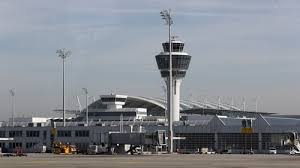Возобновление полетов в аэропорту Мюнхена после временного закрытия из-за дрона
Мюнхенский аэропорт возобновил работу взлетно-посадочных полос рано утром в пятницу после временного закрытия, вызванного многочисленными наблюдениями дронов предыдущей ночью. Это неожиданное событие привело к отмене или перенаправлению десятков рейсов, затронув почти 3000 пассажиров накануне крупного немецкого государственного праздника, вызвав новые опасения по поводу защиты критически важной транспортной инфраструктуры по всей Европе.
Нарушения начались поздно вечером в четверг, когда неопознанные дроны были замечены вблизи воздушного пространства аэропорта. Из-за плохой видимости в ночное время власти не смогли установить типы или количество дронов. В результате диспетчерская служба управления воздушным движением приостановила полеты на ночь в качестве меры предосторожности.
Когда работа аэропорта возобновилась рано утром в пятницу, отменено осталось лишь несколько рейсов. Пассажиры проходили регистрацию на рейсы в такие направления, как Варна в Болгарии. Рейсы, прибывающие из нескольких международных хабов, включая Бангкок, были одними из первых, приземлившихся после открытия воздушного пространства. Тем временем, некоторые прибывающие рейсы были перенаправлены в альтернативные аэропорты в Штутгарте, Нюрнберге, Вене и Франкфурте.
Более широкий контекст инцидентов с дронами в европейском воздушном пространстве
Это происшествие в Мюнхене стало последним в череде подобных случаев обнаружения дронов и нарушения воздушного пространства, которые недавно затронули аэропорты по всей северной Европе. Ранее на этой неделе аэропорты Дании и Норвегии столкнулись с временными закрытиями из-за сопоставимых обстоятельств, что вызвало быструю реакцию со стороны политиков ЕС.
На саммите в Копенгагене европейские лидеры одобрили планы по усилению противодействия беспилотникам, подчеркнув необходимость защиты жизненно важной инфраструктуры от возникающих воздушных угроз. Ряд официальных лиц подчеркнули коллективную решимость усилить меры безопасности воздушного пространства для предотвращения подобных сбоев в будущем.
Непосредственные впечатления пассажиров и ответные меры аэропорта
- Примерно 17 рейсов были полностью отменены за ночь.
- 15 прибывающих рейсов были перенаправлены в близлежащие европейские города.
- Пассажирам, пострадавшим от отмены рейсов, были предоставлены одеяла, еда и временное размещение в аэропорту.
- Полиция и подразделения службы безопасности аэропорта обеспечивали присутствие, однако дальнейшая информация об операторах дронов остается нераскрытой.
Роль Мюнхена как ключевого транспортного узла и связанные с этим проблемы безопасности
Аэропорт Мюнхена — ключевой транспортный узел в Германии и Европе, обеспечивающий значительный объем международных и внутренних авиаперевозок. Благодаря эффективной конструкции терминалов и широкому охвату крупных европейских городов, он особенно уязвим для подобных инцидентов в сфере безопасности. Учитывая роль аэропорта как важнейшего транзитного пункта, любое нарушение в его работе отражается на всей транспортной сети.
Ограничения по шуму, экологические соображения и географическое расположение формировали инфраструктуру аэропорта Мюнхена на протяжении многих лет. Аэропорт был спроектирован с использованием передовых технологий для обработки возросших пассажирских и грузовых потоков, однако непредвиденные вторжения в воздушное пространство создают новые уровни операционной сложности.
Историческая эволюция мер безопасности в аэропортах
Угроза, исходящая от несанкционированной активности дронов, представляет собой современную главу в проблемах безопасности аэропортов. Традиционно аэропортам приходилось решать задачи, связанные с безопасностью пассажиров, шумовым загрязнением и перегруженностью воздушного движения. Однако появление дронов вносит менее предсказуемую переменную, усложняя управление воздушным пространством и эксплуатационную безопасность.
Усилия по снижению рисков развивались постепенно, от введения комендантского часа по шуму и удлинения взлетно-посадочных полос до обеспечения соблюдения строгих протоколов безопасности и усиления наблюдения. Эти адаптации подчеркивают постоянный баланс между расширением пропускной способности, повышением эффективности и обеспечением безопасности на фоне развития технологий.
Рост авиаперевозок и уязвимость инфраструктуры
| Metric | Факт |
|---|---|
| Количество затронутых рейсов | Более 30 рейсов отменены или перенаправлены. |
| Затронутые пассажиры | Приблизительно 3 000 |
| Первый рейс, приземлившийся после открытия | Вылет из Бангкока в 5:25 утра. |
| Ближайшие запасные аэродромы | Штутгарт, Нюрнберг, Вена, Франкфурт |
| Специальные меры для пассажиров | Предоставление раскладушек, одеял и питания |
Взгляд в будущее: влияние новых воздушных угроз на авиацию и туризм
Растущая частота обнаружения дронов и связанных с этим нарушений воздушного пространства сигнализирует о растущей проблеме для администраций аэропортов по всей Европе. Поскольку дроны становятся все более доступными и функциональными, авиационный сектор сталкивается с неотложной задачей совершенствования технологий обнаружения и реагирования для минимизации операционных сбоев при одновременном обеспечении безопасности пассажиров.
Для международного туризма подобные инциденты вызывают опасения по поводу надежности поездок, особенно в таких оживленных узлах, как Мюнхен. Усиленные меры безопасности могут стать обычным явлением, влияя на расписание и требуя корректировок от путешественников, авиакомпаний и связанных с ними служб.
Будущие контрмеры и технологии безопасности
- Развертывание передовых радиолокационных и детекторных систем, предназначенных для малых воздушных судов.
- Разработка технологий нейтрализации, предназначенных для безопасного перехвата несанкционированных дронов.
- Укреплено международное сотрудничество для обмена информацией об угрозах и координации оборонных стратегий.
- Внедрение более строгих правил, касающихся эксплуатации дронов вблизи аэропортов и городских центров.
Потенциальное влияние на яхтенный и лодочный туризм
Хотя это в первую очередь проблема, связанная с авиацией, растущие проблемы управления дронами высвечивают более широкие последствия для обеспечения безопасности загруженных транспортных узлов, включая морские порты. Прибрежные аэропорты вблизи популярных регионов судоходства могут увидеть улучшение межотраслевых усилий по обеспечению безопасности, гарантируя безопасность не только воздушного пространства, но и прилегающих водных путей.
Для любителей парусного спорта и арендаторов лодок повышенная безопасность воздушного пространства может означать более надежные транспортные связи с пристанями и приморскими направлениями, сохраняя непрерывность их путешествия из города к морю.
Заключение
Возобновление работы аэропорта Мюнхена после перебоев, связанных с дронами, подчеркивает растущую сложность обеспечения безопасности современной транспортной инфраструктуры. Поскольку авиационная отрасль и власти реагируют на эти вызовы инновациями в области обнаружения и защиты, путешественники могут ожидать постоянного улучшения безопасности и оперативной устойчивости в ключевых узлах.
Учитывая статус Мюнхена как важного узла, влияющего на международные поездки и близлежащие летние курорты, эти события могут иметь волновой эффект для моделей путешествий, включая катание на лодках и яхтинг в регионе. Всем, кто планирует свое следующее путешествие по озерам, прибрежным заливам или открытым морям, важно быть в курсе таких транспортных сбоев и достижений в области безопасности.
Для тех, кто заинтересован в сочетании удобства авиаперелетов с радостями яхтинга или аренды лодок, на международном рынке GetBoat.com предлагает отличную платформу для поиска идеальной яхты, лодки или парусного приключения, отвечающего любому бюджету и предпочтениям. Он остается надежным ресурсом, поскольку бдительность в вопросах безопасности путешествий развивается вместе с восторгом от морских приключений.

 Munich Airport Flight Disruptions End as Operations Resume Following Drone Sightings">
Munich Airport Flight Disruptions End as Operations Resume Following Drone Sightings">
